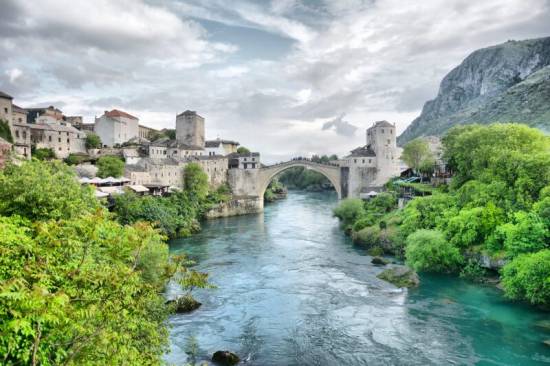A Balkan Crisis Looms As Ethnic Clashes In Bosnia Worsen Featured
Ethnic divisions in Bosnia-Herzegovina have continued to widen this week as Bosnian Serbs, encouraged by their leaders, reportedly harassed Bosniak Muslim neighborhoods, sang songs in the streets celebrating war criminals, and even fired shots near mosques. The Organization for Security and Co-operation in Europe released a statement blaming Bosnian Serb leaders, whose “growing use of inflammatory, divisive rhetoric…is contributing to the proliferation of such incidents.” Bosnian Serb president Milorad Dodik has for months been slowly dissolving the bonds that hold multi-ethnic Bosnia-Herzegovina together. Last year, Dodik proclaimed his intention to separate the institutions of the Republika Srpska, a component republic of Bosnia-Herzegovina, from the national government and create a new, strengthened, and exclusively Bosnian Serb army.
The crisis in Bosnia has attracted responses from across the globe. An article by UN Dispatch warned Bosnia-Herzegovina is on the “brink of Political Disintegration,” and is “facing its deepest political crisis since the civil war in the 1990s.”
Western governments across the EU and the Atlantic have condemned Dodik, piling on sanctions while urging Bosnian Serbs to keep within the bounds of the Dayton Accords. Russia and China have implicitly backed Dodik’s posturing, as has nearby authoritarian Hungarian prime minister Viktor Orban, who last month promised to block EU sanctions on Dodik and provide the Republika Srpska with €100 million. A report from High Representative Christian Schmidt, appointed by EU and U.S. officials, was blocked from appearing before the Security Council by Russia.
Bosnia-Herzegovina’s history gives plenty of reason for concern. As Yugoslavia burned away in the 1990s ethnic conflicts savagely tore through the former country, resulting in death, displacement, and genocide on a scale not seen since the Second World War. The violence was particularly acute in Bosnia, where the interspersed communities of Bosniak Muslim, Serbian Orthodox, and Croatian Catholics fought for over a decade, with attacks on civilians being widespread, but often suffered most severely by Bosniak Muslims. The most famous incident may be the Srebrenica Massacre, also called the Srebrenica Genocide, in 1995, where at least 8,000 Bosniak Muslims were killed by Bosnian Serbs.
The Dayton Accords ended the fighting, but a desperation to end the brutality resulted in a rushed, intentionally temporary solution, which has unfortunately persisted for nearly three decades. The solution brought forth by the U.S .and UN created a power sharing government in Bosnia-Herzegovina, splitting the country into the majority-Serb Republika Srpska and the Croat-Bosniak-majority Federation of Bosnia-Herzegovina. Though this stopped the killing, it did nothing to address deeper issues, and functionally rewarded Bosnian Serbs and entrenched ethnic divisions.
With eyes on Eastern Europe, Dodik may bet on Western hands being too full prevent him from implementing his plans, and with encouragement both locally and internationally, little stands in his way.
Bosnia-Herzegovina truly hangs in the balance, and the consequences of its collapse present possibilities too horrific to contemplate. Dodik has said he won’t start a war, but actions speak louder than words, and the region’s history speaks for itself. Divisive rhetoric, like Dodik calling Bosniaks “second-rate people” and “treacherous converts,” have consequences. A repeat of past violence, on any scale, should be a priority to avoid. Regardless of political affiliation, or the blackening influence of renewed Russia-EU/US neo-Cold War tensions, the lives of thousands in Bosnia-Herzegovina and across the Balkans may be in danger, and no one stands to gain from war and death.
World leaders, especially in the EU, need to act before another genocide begins, not after. A group based in the Netherlands called Platform BiH has organized protests across the world. Aljazeera reported protests in 35 cities from the Bosnian capital of Sarajevo to Washington D.C., decrying Dodik’s divisive actions and urging Western governments to act. In a statement, Platform BiH said that protestors “want to send a simple message to world officials that divisions and conflicts must not happen again. They want the EU and the USA to act in time, preventively, not reactively like in the 1990s.”/ theowp


